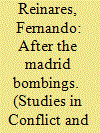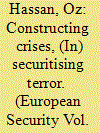|
|
|
Sort Order |
|
|
|
Items / Page
|
|
|
|
|
|
|
| Srl | Item |
| 1 |
ID:
088745


|
|
|
|
|
| Publication |
2009.
|
| Summary/Abstract |
Approaching the Madrid train bombings of 11 March 2004 from a security perspective, the occurrence of these highly lethal blasts made it evident not only a major intelligence failure, but also serious problems in the coordination between law enforcement agencies and deficiencies in international cooperation to prevent such deadly manifestations of global terrorism. As a result, governmental measures adopted in Spain immediately afterwards to reform the internal security structures and thus more adequately face the persisting risks and threats associated with that phenomenon, paid particular attention to increasing intelligence capabilities, advancing antiterrorist coordination and strengthening collaboration with relevant nations, alongside other initiatives aimed at preventing and countering al-Qaeda related terrorist activities. Overall, those measures enjoyed a high degree of legitimation among citizens
|
|
|
|
|
|
|
|
|
|
|
|
|
|
|
|
| 2 |
ID:
107158


|
|
|
|
|
| Publication |
2011.
|
| Summary/Abstract |
In 2004, an al Qaeda affiliate killed 191 civilians in Madrid. Spain's general election three days later confounded pollsters' expectations; the incumbent Partido Popular was ousted by the challenging Partido Socialista Obrero Español ( psoe ), a party committed to withdrawal from Iraq. This manuscript examines the notion that this was a strategic terrorist success. The first strategic form considered is coercive bargaining. The paper finds that al Qaeda is not a credible coercive agent and debunks the popular myth that Spanish voters entered a coercive bargain with the network. The paper also considers the attacks through the strategic frameworks of terrorist advertising, provocation, regime destabilization, and morale building. It finds that the attacks' only strategic achievement was building morale. Finally, the paper provides a multi-factor explanation of how the Madrid bombings contributed to the psoe victory despite their lack of strategic impact. The upshot of the analysis is that there is little reason to believe such electoral impact is replicable.
|
|
|
|
|
|
|
|
|
|
|
|
|
|
|
|
| 3 |
ID:
101011


|
|
|
|
|
| Publication |
2010.
|
| Summary/Abstract |
The European Union's (EU) counter-terrorism strategy has been particularly dynamic, developing as a result of 'crises' and subsequent post-crisis narrations. The events of 11 September 2001, and the Madrid and London bombings have proved to provide moments of punctuation from which policy evolution and institutionalisation has followed. As a result of such crises, the EU has increasingly regarded terrorism as a direct challenge to the Union's role as a security actor and sought to institutionalise a diverse range of security governance technologies across its multiple pillars. Such an approach is noticeable for its qualitative difference compared to EU strategy pursued throughout the end of the twentieth century, and demonstrates an increased willingness for the EU to assert its role in the world. Yet, what is highly noticeable from the EU strategy and the proliferation of security governance technologies is the manner in which the EU has securitised 'terrorism' in the pursuit of internal, external and normative objectives. As a consequence, the EU has inflated the threat posed by terrorism, and increasingly attempted to 'Europeanise' its response. Evident in such a strategy however, is the manner in which counter-terrorism practices can generate greater insecurity inside and outside of the Union.
|
|
|
|
|
|
|
|
|
|
|
|
|
|
|
|
|
|
|
|
|